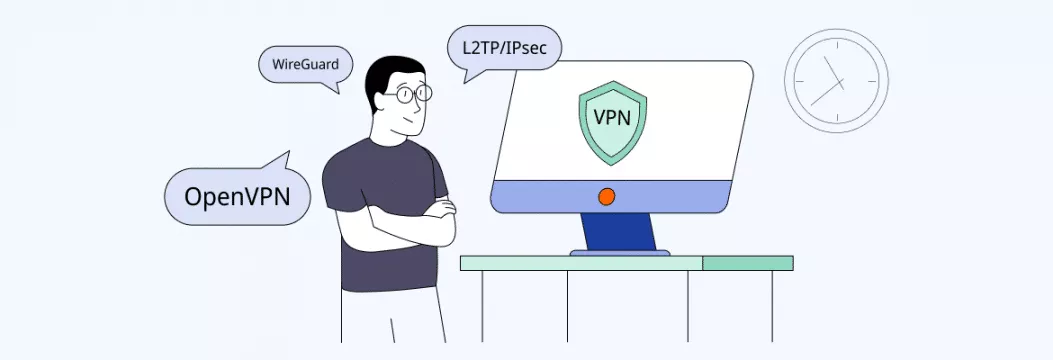What Are VPN Protocols and Which One to Choose?

You don’t have to be a tech guru to use a virtual private network (VPN). This tool is generally easy to set up and run, regardless of your device and operating system. However, if you want to make the most out of the VPN solution, you need to understand how it functions and what impacts its efficiency. In particular, VPN protocols are among the most significant factors responsible for the tool’s performance. They directly affect the stability, speed, and security of your VPN connection.
If you’ve already heard something about OpenVPN, WireGuard®, or IKEv2 and think these are too complicated technical details to dive into, don’t worry. From this article, you will learn what VPN protocols really are, how they function, and how to pick the one that will fit your needs best in as plain language as possible.
What is a VPN protocol?
Let’s start with the basics and provide a definition of a VPN protocol.
A VPN protocol is a set of rules that regulate the way your data travels between your device and a VPN server. When a virtual private network alters your IP address and runs your traffic through an encrypted tunnel, a VPN protocol determines how this tunnel is formed and what it consists of. In turn, those components affect your VPN connection’s security, speed, and the power of encryption.
In a nutshell, if a virtual private network service were a spacecraft, VPN protocols would be the processes and commands responsible for its secure, smooth, and somewhat successful launch to space.
But while we can compare the functioning of VPN protocols to the essentials of space travel, understanding how to pick a tunneling protocol for your goals is not rocket science. In fact, among multiple existing options, many are either outdated and inefficient or not tested by time yet. Only several protocols are powerful enough to ensure safe, fast, and seamless VPN connection. But at the same time, there is no such thing as the best VPN protocol, as each of the top options has its own pros and cons.
That is why reliable VPN services normally offer several protocols to choose from. So it’s time to reveal the most common VPN protocols, explain their benefits, and determine which one will perfectly cover your individual needs.
Main types of VPN protocols
Among numerous VPN protocols out there, the following ones are the most widespread because of their reliable encryption, security, and stability. Let’s take a closer look at each of them and their key specifics.
1. OpenVPN
OpenVPN is probably the most well-known and one of the most secure VPN protocols. It’s an open-source connection protocol that aims at establishing protected tunneling between two destinations in a network. It uses the TLS (transport layer security) standards and is based on one of the two powerful internet protocols:
- TCP (transmission control protocol) ensures the order and consistency of communicating data.
- UDP (user datagram protocol) provides faster communication speeds of data transmission.
Besides, OpenVPN is normally empowered with reliable AES-256 encryption, which makes it easier for experts to detect and eliminate any security vulnerabilities. The main drawback of OpenVPN is that it may be more challenging to set up. But this issue doesn’t affect clients of VPN services using this protocol.
Pros of OpenVPN:
👍 Open-source nature. Anyone can check the code for potential security problems and get rid of them.
👍 Top-notch security. OpenVPN can be adapted to any encryption standards, making it ultimately secure.
👍 Efficiency against firewalls. With OpenVPN, you can bypass even the most sophisticated firewalls and enhance your online freedom.
Cons of OpenVPN:
👎 Difficult to set up. OpenVPN’s code is quite complex because of its versatility. So setting it up can be challenging for users without technical expertise.
✅ Best use: OpenVPN ensures complete security, so you can use it when making money transactions, using a public Wi-Fi network, or dealing with sensitive data.
2. WireGuard®
WireGuard® is one of the most modern, stable, and fast VPN protocols. Just like OpenVPN, it’s open-source, so it’s easy for developers to debug and modify the code if necessary. On top of that, WireGuard® has much shorter code (nearly 4,000 lines compared to the 400,000 lines that OpenVPN consists of), making it easier to set up. Besides, the most compelling advantage of WireGuard® is its blazing speed.
The only downside of WireGuard® has the exact cause as its benefits. Since this tunneling protocol is relatively new, it’s often not an ultimate solution and may still have certain vulnerabilities.
Pros of WireGuard®:
👍 Lightning speed. WireGuard® works much faster than more traditional VPN protocols, such as OpenVPN and IKEv2/IPSec.
👍 Open-source and free. WireGuard® is available for everyone and has much simpler and shorter code than its alternatives.
Cons of WireGuard®:
👎 Not tested by time. WireGuard® is still an incomplete solution, so it may not be 100% secure in some cases.
✅ Best use: WireGuard® is perfect for streaming media and playing games due to its outstanding speed.
3. IKEv2/IPSec
IKEv2 (Internet key exchange version 2) is a top-rated VPN protocol that provides powerful encryption and authentication, which leads to fast, reliable, and secure connection. It uses IPSec (Internet Protocol Security) as an integral component of the security toolkit and covers VPN encryption. The main advantage of IKEv2/IPSec is the protocol’s stability when you switch to mobile data, thanks to additional tools specifically designed to cover the transition between Internet connections.
IKEv2 was originally created by Microsoft and Cisco, so it better serves the needs of Windows users. However, it lacks compatibility when it comes to other operating systems.
Pros of IKEv2/IPSec:
👍 Stable connection. IKEv2/IPSec easily handles the journey from one Internet connection to another.
👍 Security. IPSec, empowered with the IKEv2 authentication protocol, works with the most reliable VPN encryption standards.
👍 High-level speed. This protocol is very fast, especially if you pick a VPN server located nearby. It’s also capable of overcoming firewalls.
Cons of IKEv2/IPSec:
👎 Not compatible with all operating systems. While being completely effective for Windows and Android users, it may require adapted versions for macOS, iOS, and Linux.
✅ Best use: IKEv2/IPSec is suitable when you need to quickly change the Wi-Fi network to mobile data. Besides, its connection speed is enough for streaming media.
4. L2TP/IPSec
L2TP (Layer 2 tunneling protocol) is another protocol empowered by IPSec to ensure a protected VPN connection. It’s a relatively secure and stable solution, but many VPN services, including VeePN, do not support it.
One of the main reasons to prioritize other VPN protocols is that L2TP/IPSec is significantly slower than the alternatives mentioned above. That’s because it encapsulates your data twice while running it through the tunnel. Another reason is the inability to effectively go through firewalls. Last but not least, it involves the risk of compromising privacy because of cooperating with the NSA (National Security Agency).
Pros of L2TP/IPSec:
👍 Availability. L2TP/IPSec suits most modern devices and systems, so it’s relatively easy to maintain and fix issues when necessary.
👍 Sufficient Security. Although it’s not outstanding, the protection of the L2TP authentication protocol is equal to other protocols running IPSec.
Cons of L2TP/IPSec:
👎 May compromise users’ privacy. This risk is due to the protocols’ cooperation with NSA.
👎 Slow connection speed. Due to double encapsulation, it is much slower than other VPN protocols.
👎 Ineffective against firewalls. L2TP/IPSec doesn’t always manage to overcome advanced firewalls.
✅ Best use: L2TP/IPSec can be efficient if your online transactions’ security is the only thing that matters to you.
5. SSTP
SSTP (Secure Socket Tunneling Protocol) is another VPN protocol created and owned by Microsoft. Similar to IKEv2/IPSec, it’s better adapted for Windows users yet can also be used with other operating systems. In general, SSTP is a secure and stable VPN protocol that supports all major encryption standards, including AES-256. However, it has certain downsides as well.
In particular, just like L2TP, SSTP cooperates with NSA, resulting in the potential issues we’ve mentioned above. However, in most cases, it perfectly covers users’ privacy and effectively bypasses firewalls.
Pros of SSTP:
👍 Powerful encryption. SSTP supports all main VPN encryption protocols.
👍 Perfectly suits Windows users. Being created by Microsoft, SSTP is easy to set up and use on devices running on the Windows operating system.
Cons of SSTP:
👎 Unavailable code. Since SSTP is not open-source, developers can’t test and modify its code.
👎 Less effective for other operating systems. macOS and Linux users may find it challenging to set up SSTP.
✅ Best use: SSTP is a powerful weapon against firewalls and helps you remain anonymous when surfing the web.
6. PPTP
PPTP (Point-to-Point Tunneling Protocol) is the first VPN protocol created back in 1999. Unfortunately, its age directly affects its efficiency. PPTP runs the 128-bit encryption protocol that is now considered outdated and insecure. All modern VPN protocols allow for AES-256 encryption, as this solution leaves no chance for hackers, snoopers, and other nosy third parties to access your data. Due to numerous security vulnerabilities, PPTP is no longer supported by reputable VPN services.
Pros of PPTP
👍 Fast connection speed. As with any other outdated solution, PPTP is easy to run for modern software, so it’s pretty fast.
👍 Easy setup. PPTP is compatible with most types of devices and systems, making it easier to set up and run.
Cons of PPTP
👎 Outdated and insecure. Unlike modern VPN protocols, PPTP doesn’t support the latest encryption standards and is extremely vulnerable.
👎 Regularly decrypted. According to many sources, NSA has decrypted this VPN protocol multiple times.
👎 Incapable of bypassing firewalls. PPTP connection can be blocked by firewalls as it often fails to hide your VPN connection from third parties.
✅ Best use: PPTP will allow you to stream media when traveling, but that’s it. If you strive to enhance your Internet privacy and online security, we recommend turning to more modern and reliable VPN protocols.
Bonus: Shadowsocks
Shadowsocks is an open-source encryption protocol that adopts the proxying technique to redirect users’ traffic through a server in a remote location. It was originally designed to get around the Great Firewall of China and is an efficient method against various censorship limitations. When using Shadowsocks, your proxy connection is encrypted with SOCKS5, hiding your Internet requests from third parties and looking legit to firewalls.
However, Shadowsocks isn’t a VPN protocol since it uses other methods and technologies to secure your data. Protocols like OpenVPN, IKEv2/IPsec, and WireGuard® provide end-to-end encryption (which means that your traffic is secured at all levels). In contrast, Shadowsocks only encrypts the communication between your device and a destination server. Therefore, it works a bit faster but isn’t as ultimate privacy solution as VPNs.
However, many reliable VPN services, including VeePN, support Shadowsocks as an additional connection protocol to opt for.
Pros of Shadowsocks
👍 Fast connection speed. Since Shadowsocks works as a proxy, the encryption process takes less time than with traditional VPN protocols.
👍 Efficiency against censorship limitations. The main purpose is Shadowsocks is to overcome firewalls and other Internet censorship techniques, and it handles that with a bang.
Cons of Shadowsocks
👎 Not 100% secure. As with any other proxy solution, Shadowsocks is less secure than top-rated VPN protocols like OpenVPN and IKEv2/IPsec. It also lacks the ultimate end-to-end encryption.
✅ Best use: Shadowsocks is an excellent choice for bypassing online censorship without compromising your Internet speed.
VPN protocols cheat sheet
Let’s sum up the most significant benefits and drawbacks of the most common VPN security protocols by comparing their strengths and weaknesses.
VPN protocol | Encryption | Security | Stability | Speed | Setup | Available with VeePN |
OpenVPN | AES-256 | High | High | Fast | Medium | ✅ |
WireGuard® | AES-256 | High | Very high | Very fast | Easy | ✅ |
IKEv2/IPsec | AES-256 | High | Very high | Fast | Medium | ✅ |
L2TP/IPSec | AES-256 | Medium | High | Medium | Easy for Windows OS | 🚫 |
SSTP | AES-256 | Medium | Medium | Medium | Easy for Windows OS | 🚫 |
PPTP | 128 bit | Low | High | Fast | Very easy | 🚫 |
In conclusion, almost every VPN protocol, except for outdated and insecure ones, has its own superpower that sets it apart from the rest of the list. All you have to do is determine your key goals and pick the one that handles it better than others. That is where the question emerges:
How to choose a VPN protocol for your needs?
If you’re wondering which VPN protocol is best, there is no one-size-fits-all solution. However, with your needs in mind, you may pick the most suitable option. Here are several best choices for various use cases.
- Best VPN protocol for gaming. To enjoy seamless gaming experiences, you need the fastest VPN protocol. WireGuard® is considered the best option for this use case. Besides, to boost the connection speed, it’s worth connecting to the nearest VPN server, which will reduce the distance of your data journey.
- Best VPN protocol for streaming media. Watching your favorite films and TV shows when traveling abroad can be challenging due to geographical limitations imposed in some countries. To get access to your preferred Netflix, Hulu, or Disney Plus library, we recommend using a fast and reliable VPN protocol, such as IKEv2/IPSec. WireGuard® is another possible option.
- Best VPN protocol for Internet privacy. If you prioritize anonymous browsing over connection speed, it’s worth turning to one of the most secure VPN protocols that provide top-notch encryption and ensure anonymity. OpenVPN perfectly fits all these standards.
Take advantage of VPN protocols’ superpowers with VeePN
You can benefit from any of the top VPN protocols mentioned in this article. However, while some are less secure than others (or simply based on obsolete technologies), there are three most stable, secure, and effective options: OpenVPN, WireGuard®, and IKEv2/IPSec. Whether your main priority is private browsing, streaming media, fast connection, or outstanding stability, this set of protocols will get you covered.
Looking for a reputable virtual private network that involves these top-rated VPN protocols? Try VeePN! It’s a powerful VPN solution that ensures complete security, privacy, and connection speed. With VeePN, you can choose a VPN protocol that suits your needs best without worrying about your online safety. VeePN uses only the most secure AES-256 encryption and adheres to a transparent No Logs policy. Choose VeePN plan for your individual needs with a 30-day money-back guarantee!
FAQs
What is the fastest VPN protocol?
WireGuard® is the fastest VPN protocol as it involves more rapid connection time and doesn’t consume much energy for mobile devices. Another good option for those looking for faster connection speed is IKEv2/IPSec. However, it’s worth noting that the chosen VPN protocol is not the only thing that impacts your connection. It also depends on your device, the distance from your location to the VPN server, and your Internet speed itself. Besides, your connection speed may be limited due to Internet throttling imposed by your Internet service provider.
What is the most secure VPN protocol?
OpenVPN is considered the most secure VPN protocol as it uses not only the essential AES-256 encryption but also several additional encryption standards, including CAST-128, AES, 3DES, and Blowfish. However, IKEv2/IPSec and WireGuard® are also fairly secure VPN protocols that follow all the necessary standards to protect users’ data.
What is the most stable VPN protocol?
Most experts agree that IKEv2/IPSec is the most stable VPN protocol. That is because it ensures reliable connection and allows you to switch between networks (for instance, change Wi-Fi connection to mobile data) without compromising the efficiency of the VPN connection.
What is the easiest VPN protocol to set up?
PPTP is the oldest VPN protocol, so it’s set in many devices by default and doesn’t require much effort to set it up. However, it’s not recommended due to its numerous security vulnerabilities. As for more modern and reliable protocols, WireGuard® and IKEv2/IPSec are excellent alternatives. Besides, if you’re using a VPN service like VeePN, you don’t have to worry about setting up different VPN protocols as you can change them in your client app in just a few clicks. Learn more in this article.
VeePN is freedom
Download VeePN Client for All Platforms
Enjoy a smooth VPN experience anywhere, anytime. No matter the device you have — phone or laptop, tablet or router — VeePN’s next-gen data protection and ultra-fast speeds will cover all of them.
Download for PC Download for Mac IOS and Android App
IOS and Android App
Want secure browsing while reading this?
See the difference for yourself - Try VeePN PRO for 3-days for $1, no risk, no pressure.
Start My $1 TrialThen VeePN PRO 1-year plan






